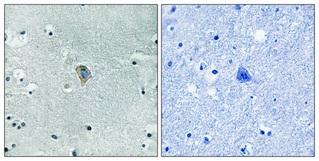KOR-1 (phospho Ser369) Polyclonal Antibody
- Catalog No.:YP0301
- Applications:WB;IHC;IF;ELISA
- Reactivity:Mouse;Rat
- Target:
- KOR-1
- Gene Name:
- OPRK1
- Protein Name:
- Kappa-type opioid receptor
- Human Swiss Prot No:
- P41145
- Mouse Gene Id:
- 18387
- Rat Gene Id:
- 29335
- Rat Swiss Prot No:
- P34975
- Immunogen:
- The antiserum was produced against synthesized peptide derived from mouse KOR-1 around the phosphorylation site of Ser369. AA range:331-380
- Specificity:
- Phospho-KOR-1 (S369) Polyclonal Antibody detects endogenous levels of KOR-1 protein only when phosphorylated at S369.
- Formulation:
- Liquid in PBS containing 50% glycerol, 0.5% BSA and 0.02% sodium azide.
- Source:
- Polyclonal, Rabbit,IgG
- Dilution:
- WB 1:500 - 1:2000. IHC 1:100 - 1:300. ELISA: 1:10000.. IF 1:50-200
- Purification:
- The antibody was affinity-purified from rabbit antiserum by affinity-chromatography using epitope-specific immunogen.
- Concentration:
- 1 mg/ml
- Storage Stability:
- -15°C to -25°C/1 year(Do not lower than -25°C)
- Other Name:
- OPRK1;OPRK;Kappa-type opioid receptor;K-OR-1;KOR-1
- Observed Band(KD):
- 42kD
- Background:
- Endogenous opioid peptides and opiates, like morphine, transmit their pharmacological effects through membrane bound opioid receptors. Pharmacological studies and molecular cloning have led to the identification of three different types of opioid receptor, mu-type, delta-type and kappa-type, also designated MOR-1, DOR-1 and KOR-1, respectively. MOR-1 is a receptor for beta-endorphin, DOR-1 is a receptor for enkephalins, and KOR-1 is a receptor for dynorphins.The three opioid receptor types are highly homologous and belong to the superfamily of G-protein-coupled receptors. Opioid receptors have been shown to modulate a range of brain functions, including instinctive behavior and emotions. This regulation is thought to involve the inhibition of neurotransmitter release by reducing calcium ion currents and increasing potassium ion conductance.
- June 19-2018
- WESTERN IMMUNOBLOTTING PROTOCOL
- June 19-2018
- IMMUNOHISTOCHEMISTRY-PARAFFIN PROTOCOL
- June 19-2018
- IMMUNOFLUORESCENCE PROTOCOL
- September 08-2020
- FLOW-CYTOMEYRT-PROTOCOL
- May 20-2022
- Cell-Based ELISA│解您多样本WB检测之困扰
- July 13-2018
- CELL-BASED-ELISA-PROTOCOL-FOR-ACETYL-PROTEIN
- July 13-2018
- CELL-BASED-ELISA-PROTOCOL-FOR-PHOSPHO-PROTEIN
- July 13-2018
- Antibody-FAQs
- Products Images

- Western Blot analysis of various cells using Phospho-KOR-1 (S369) Polyclonal Antibody diluted at 1:1000
.jpg)
- Western Blot analysis of Rat-kidney cells using Phospho-KOR-1 (S369) Polyclonal Antibody diluted at 1:1000

- Immunohistochemical analysis of paraffin-embedded Human brain. Antibody was diluted at 1:100(4° overnight). High-pressure and temperature Tris-EDTA,pH8.0 was used for antigen retrieval. Negetive contrl (right) obtaned from antibody was pre-absorbed by immunogen peptide.

- Western blot analysis of lysates from NIH/3T3 cells, using KOR-1 (Phospho-Ser369) Antibody. The lane on the right is blocked with the phospho peptide.



